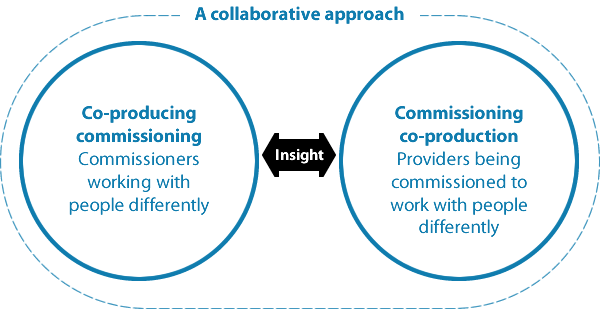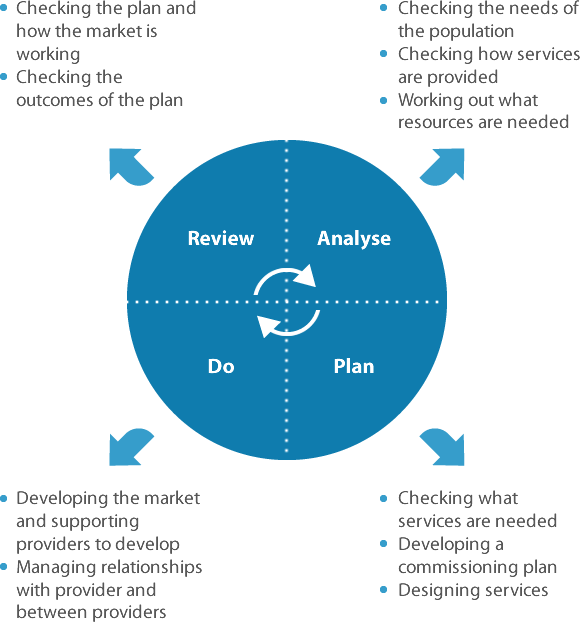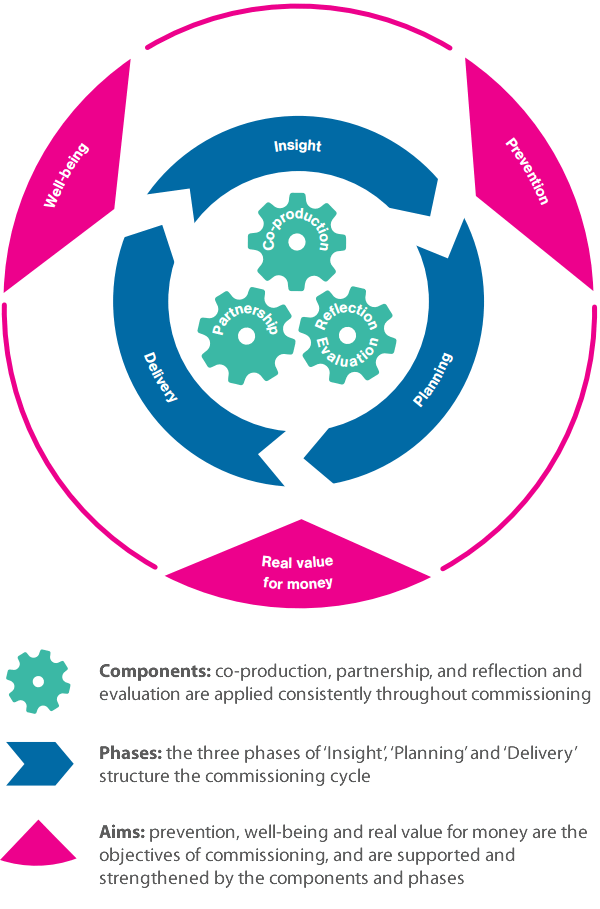Co-producing commissioning and commissioning co-production
There are two main ways in which commissioning can really involve co-production in public services.

Commissioning co-production. When councils encourage providers to co-produce services, they are commissioning co-production. Making sure that local providers design and deliver services in a co-produced way is an important step and something that should be encouraged.
However, a sole focus on this approach risks limiting the role of co-production to influencing what individual providers do, rather than shaping the full range of services and supports needed across an area. When councils or other agencies commission co-production, they do not themselves need to build different relationships with people with care and support needs, carers and family members. Commissioners expect co-production to happen between providers and people who use services. Commissioning co-production is not the same as involving people as equal partners throughout the whole commissioning process.
Co-producing commissioning. Co-producing commissioning means equally involving people who use services, carers, families and communities throughout the commissioning cycle. Here, people will help to:
- Explain about local needs, aspirations and assets.
- Make important decisions about what things are needed to make sure people have better lives and how to make these things happen.
- Decide which providers are chosen to provide services and supports.
- Check and feedback about how well providers are doing and how they could do better.
There are generally four parts to commissioning, as this diagram shows.

Commissioners often find that trying to add co-production to this process can be difficult. The traditional commissioning cycle focuses on understanding what is missing in a community (so that services can help), rather than understanding the assets a community already has which might be built upon. Whilst commissioning has always sought to engage people for their views, the approach has rarely prioritised collaboration or co-production and has tended to assume that commissioners are equipped with the answers. This means that increasing real involvement with citizens and providers often becomes extra work rather than an integral part of the process.
The New Economics Foundation (NEF) has worked with commissioners to change how the commissioning cycle looks, because this needs to be different so that co-production is embedded from the beginning. The diagram below shows how this new model is split into three phases:
- Insight - understanding about what outcomes are important to people using services and what kinds of support could make these happen;
- Planning support and activities to meet the needs and build on the assets of local people; and
- Delivery - making it happen! [33]

To co-produce commissioning, co-production must be an integral part of each of these three phases. This should start with:
- Identifying people who will benefit from the services and their carers and including them throughout the commissioning process;
- Understanding that the knowledge and experience people have can work alongside the skills and experience commissioners bring; and
- Supporting those people to be an equal part of the commissioning process.
Co-producing commissioning means that commissioners need to use new methods or activities. It also means that they need to stop doing some familiar activities too, which is just as important.
This approach means that the commissioning is open and inclusive and creates an environment where people can be creative and try new things. It should go well beyond asking people for feedback about decisions that have already been taken.
Commissioners working in this way often use methods such as:
- Working Together for Change
- Peer research
- World Café
- Photojournalism
- Appreciative Inquiry
- Prototyping
- Asset mapping
- Story telling
- Hack days
- Coaching
- Self-reflection tools
- User journey mapping
- Open space
This approach means that commissioners and providers (large and small, formal and informal) work more closely together. Some commissioners may have concerns about this because of laws around competition in procurement. Think Local Act Personal says that commissioners can manage this concern by 'making sure that all their dealings with providers are transparent and open to all'.[34] A Market Position Statement can act as a useful starting point to making sure relationships are open and honest.
[33] Slay, J. & Penny, J. (2014). Commissioning for outcomes and co-production: A practical guide for local authorities. London, New Economics Foundation. (opens new window)
[34] Carrier, J. Be Bold: developing the market for the small numbers of people who have very complex needs. NDTi and Think Local Act Personal. (opens new window) p.14
Practical Examples
- Co-producing an outcomes framework
- Appreciative Inquiry
- Asset Mapping
- Commissioning co-production
- Lancashire County Council
- Manchester Area Partnership Market Position Statement
- Co-producing a new advocacy service in Kent: Getting started
- Carers Information and Advice in Kirklees
- Lambeth Living Well Collaborative
